Philanthropy in the New Millennium: Lord Mayor’s Charitable Foundation’s Second Century
From decarbonisation to collaboration, Lord Mayor’s Charitable Foundation stands on the brink of another century of change.
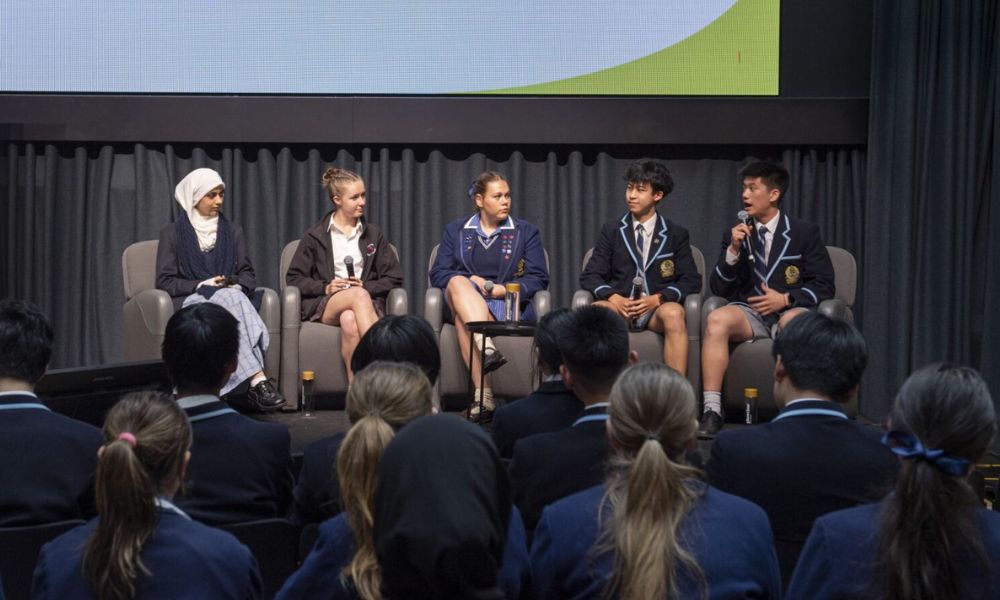
Participants in the 2023 Youth in Philanthropy program share their learnings at the Insights event.
Lord Mayor’s Charitable Foundation has been working for a century on many fronts, ensuring readily available healthcare, and advocating for society’s most vulnerable. Today, the Foundation looks to the challenges of the future, championing economic inclusion and building a greener world. And behind the scenes, the Foundation is working to ensure a sustainable, impactful approach internally and across the not-for-profit sector.
But Nick Iliomanis, the Foundation’s CFO, says this commitment should begin at home. So in the last twelve months, the Foundation has moved towards decarbonising its investments.
”It seemed like a misstep not to have our investments align with our values and culture,” he says.
To that effect, the Foundation is actively strategising to divest its portfolio of high-emitting assets; last year, it implemented a 75 per cent carbon reduction overlay of its international investment portfolio and is making investments into green energy and renewable industries. It’s a complex process, but, with a generational shift in philanthropic giving, Nick says that when it comes to ethics, it’s what donors expect.
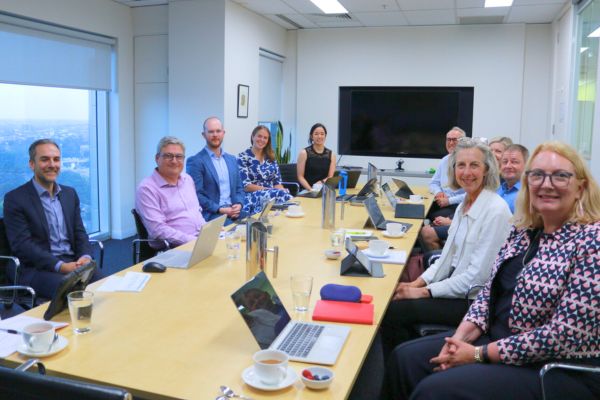
Lord Mayor's Charitable Foundation Investment Committee. The Foundation has moved towards decarbonising its investments.
“As the younger generations are assuming wealth, there’s an expectation that we work ethically,” says Nick. “They want to see a positive impact.”
“We’ve always had a responsible investment policy – [we have] exclusions for things like gaming, alcohol and tobacco. But we’re constantly thinking, Are we doing enough?”
Nick is quick to point out that it’s not just a feel-good exercise. “It’s about leadership,” he says.
“We’re setting a standard, showing that it can be done. And it can be done without hurting your returns.”
Nick Iliomanis
Nick says the collaborative nature of contemporary philanthropy is another big shift in the sector. “Rather than foundations and organisations holding their cards close to their chest, many are realising it’s a better use of capital to be collaborative,” he says.
He gives an example. “If five foundations want to invest in one company, it doesn’t make sense to pay five advisors to do due diligence. That’s money that can go to impact investing rather than financial fees.”
This spirit of partnership extends to the Foundation’s grantmaking. The philanthropy of tomorrow isn’t just about writing cheques. In the last decade, the Foundation has shifted towards catalytic philanthropy.
A term coined by American philanthropy expert Mark Kramer, ‘catalytic philanthropy’ describes giving that prioritises genuine change through innovation, where the money itself is the catalyst, but the big-picture thinking of the philanthropists is where the real transformation lies. Think: philanthropic money spent changing systems and changing minds. Kramer is the co-founder and managing director of social impact advisors, FSG. The premise of the FSG philosophy is that catalytic philanthropists may be small, but they leverage their mighty skills – their voice and their community relationships – to drive social change.
The Foundation’s second century will be built on such big-picture thinking.
For many organisations, the COVID-19 crisis crystallised already existing problems. Not-for-profit legal service Justice Connect saw a significant increase in people asking for its help, particularly those struggling with rent and facing eviction. It’s had the support of the Foundation for some years, but with higher demand on the same small team, the Foundation helped them refocus on providing online tools that more people can access. It’s now an invaluable online not-for-profit legal resource.
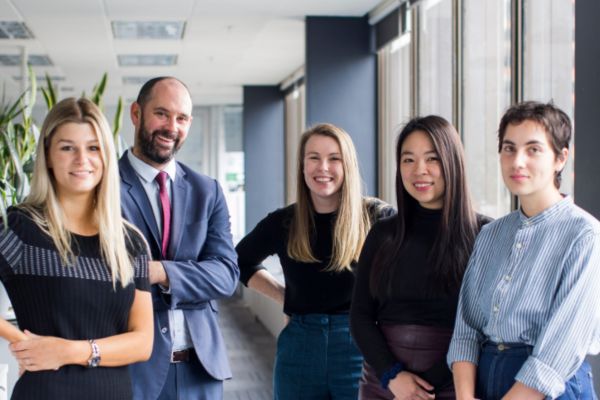
In the wake of the COVID-19 pandemic, the Foundation supported Justice Connect's Dear Landlord digital tool that helps renters understand their rights, tackling homelessness before it happens.
“It’s all about recognising the significant impact that legal need can have on people,” says Chris Povey, the CEO of Justice Connect. “Your health, your housing, your family relationships, your financial stability. It’s all at risk because you have a legal need.”
Funded by the Foundation, Dear Landlord is a digital tool that helps renters understand their rights, tackling homelessness before it happens.

Justice Connect also support the legal needs of not-for-profit groups. “It’s helping individuals and organisations, but it’s also giving us an insight into where the needs are in the community,” says Dr Catherine Brown OAM, the Foundation’s CEO.
In the social sector, COVID-19 fuelled another already critical problem – burnout and mental health strain experienced by frontline workers. The newly launched Benefolk’s digital wellbeing hub provides mental health resources for social sector professionals.
The newly launched Benefolk’s digital wellbeing hub provides mental health resources for social sector professionals.
“It’s become increasingly expected that not-for-profit groups and social sector organisations do more with less – yet the demand on them is increasing, and more and more people are feeling the effects of burnout,” Sarah Davies, chair of the Benefolk Foundation, told Philanthropy Australia last year. “Thanks to the support of Lord Mayor’s Charitable Foundation, we can start to do something about it.”
Not-for-profit social enterprise Infoxchange also received invaluable funding from the Foundation during COVID. Infoxchange has been providing technology support for the not-for-profit sector for over thirty years, and recognised that many of those organisations would simply not be equipped to make the rapid digital transition required.
Infoxchange's Digital Transformation Hub, supported by Lord Mayor's Charitable Foundation and Gandel Foundation, is helping not-for-profit organisations keep pace with technological change.
Alongside the Gandel Foundation, the Foundation stepped up to fund a digital transformation hub, giving not-for-profits the tools they need to continue to support those in need, from technical support to donated and discounted hardware. It went live in July 2021, and within its first month, 1,960 not-for-profits had used the tool. Now, that number is over 10,000.
“When we help that charity deliver better services through better use of technology, that’s then amplified by all the people they support,” says Marcus Harvey, Infoxchange’s ICT services manager. “It’s the people these charities assist that really excites us.”
Those wanting to get a glimpse at the future of philanthropy in Melbourne need only look at the Foundation’s Youth in Philanthropy program. Each year at twenty different schools, a committee of around half a dozen students is allocated $10,000 to distribute among a shortlist of charities and not-for-profits. It’s real money, solving real problems. Run by the Foundation for over twenty years, the Youth in Philanthropy now involves over 150 students each year.
“One of the biggest things I learned is just how many charities there are. In this world, where it feels like everything is going wrong, it’s really hopeful to realise that there are many more people out there who are willing to help than I thought there were.”
2022 Youth in Philanthropy Participant
Suzanne Doig, Senior Manager of Communications and Events at the Foundation, and a long-time mentor in the Youth in Philanthropy Program, says she sees students go from overwhelmed to emotionally invested. “We ask them to think deeply about what’s important to them and the issues in Melbourne, and how they think they can affect positive change. So there’s self-reflection, and they have to learn how to work together as part of a committee.”
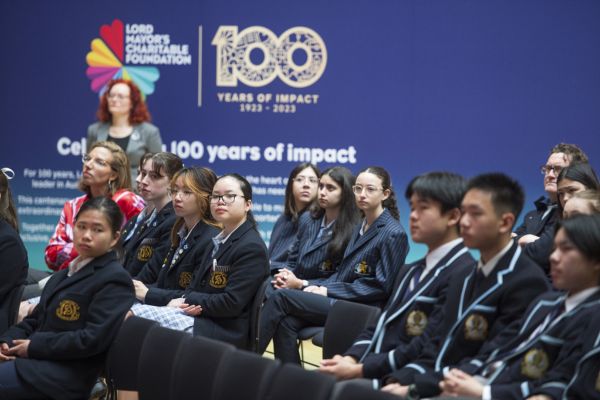
2023 Youth in Philanthropy particpants.
Suzanne says the most important part of the experience is hearing students reflect on the future they want for Melbourne.
“They tell us, ‘We want it to be inclusive and we want it to be sustainable’,” says Suzanne.
As the Foundation enters its second century, its on the verge of another big move in 2023: leaving behind its current home in Collins Street and moving into a street-level hub right by Queen Victoria Market where it will share the space with other philanthropic organisations. In many ways, it’s a return to the Foundation’s roots. In its early years, the Foundation was based in a ground-floor office in the Melbourne Town Hall, where the public could wander in off Swanston Street to make a donation. In its new home, the Foundation will once again have a front door, open to the public. It will be a hub of catalytic, collaborative philanthropy.
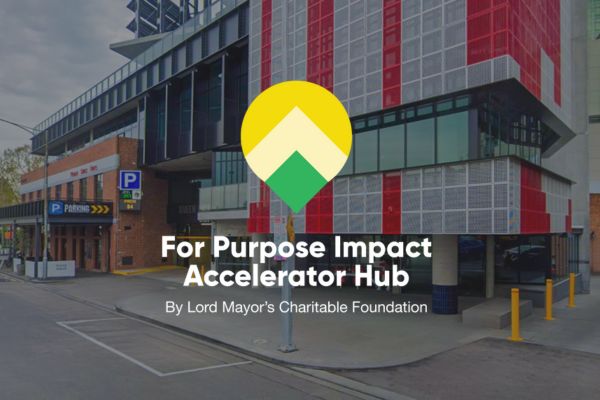
The For Purpose Impact Accelerator Hub by Lord Mayor's Charitable Foundation opened in November 2023.
Looking back over the century, the story of the Foundation is the story of this city.
“There are community foundations like us all over the world,” says Catherine. “If a city has a foundation like ours, they are building up their ability to adapt to whatever comes along. It’s a kind of community insurance.”
Community Foundations Australia, an organisation connecting such groups around the country and ensuring they can collaborate and learn from one another, has thirty-eight members nationwide. There are an estimated 1800 similar foundations around the world. Each is by and for the people of the community.
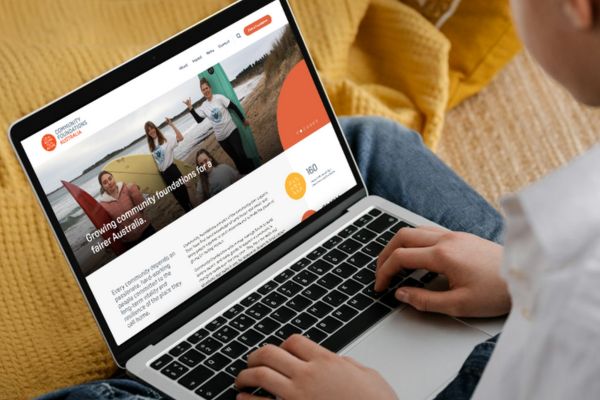
Lord Mayor's Charitable Foundation is one of 38 in Australia.
In the last fifty years, since the Foundation’s transition away from its singular focus on hospitals and healthcare, it’s been adaptable in its approach to helping vulnerable people and communities. Even in the last ten years, with its strong focus on pressing issues like climate change and affordable housing, the Foundation is still committed to filling gaps in funding. These days it also thinks ahead of the pack.
“As government funding in different areas catches up, we have to adapt, to work in areas that are failing,” says Catherine. “We’ve always had a focus on supporting the most vulnerable and helping them through difficult times. That has never changed. And we still pool resources to tackle these problems. These themes still underpin what we do. It’s strange to think that it’s so consistent, actually.”
And the next 100 years?
“We might solve a lot of things, but we might not,” says Catherine. “We have to be brave.”